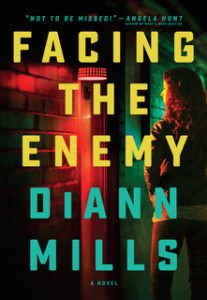Curiosity – The Writer’s Magic
Today’s guest post is by DiAnn Mills.
Curiosity is the magic ingredient that keeps readers turning pages. The reader’s mind nudges them with unanswered questions, concerns about the character, and the unexpected plot twist. The reader becomes part of the adventure, laughing, crying, celebrating, and sometimes running for their lives.
Recently, a writing client and I were editing a chapter of his book together. The reading ended and so did our time, but he’d successfully created curiosity in me. I couldn’t stop reading. I had to know what happened next!
His response still makes me laugh while encouraging me to ensure that the same magic drips into my stories. “Your enthusiasm for the story gives me the motivation to keep going. The curiosity is gold, just pure gold.”
Writer, think about mixing the charm and an allurement of curiosity with the interest and fascination of magic and you have the ingredients for a best-selling novel.
I studied the areas in the writer’s story, noting where he’d spun words into gold and found eight ways he’d created magical curiosity.
- The writer fashioned unique characters who possessed different dreams, goals, problems, challenges, weaknesses, victories, and motivations that enhanced the story.
- The writer selected character names that were easy to say and spell and didn’t sound like the other characters. As a writer, I understood the meaning of each name, and the characters lived up to their names.
- The writer showed the emotions of key characters to deepen stress, tension, and conflict. Emotive conflict built the suspense in every line.
- The writer developed a story world setting that took on the role of an antagonist. No matter where the protagonist stepped, danger lurked in the background from unsuspecting places and people. This forced the character to adapt, change, and grow as needed.
- The writer wove a plot filled with opposing goals, rising danger, unpredictability, and a high likelihood of the hero failing. I feared for his safety, and I couldn’t see how the protagonist could succeed.
- The writer used dialogue like a battlefield to stir up more conflict. Words flung back in forth at times to manipulate, tease, or force the protagonist into a terrible abyss. Other times the dialogue revealed inner emotions and sincerity.
- The writer’s distinct voice is evident throughout. The only way to accomplish a masterful voice is to write. The more the writer labors over their craft, the deeper the voice.
- The writer understood the value of keeping the narrative short. Readers today want action. Their eyes skim to the white spaces that indicate dialogue and energy. Every word of narrative must pack a punch to show the inner character’s thoughts and emotions in a clear and concise manner.
Writers work hard to draw a reader into their stories. What about you? How does a writer enhance your curiosity? Which one of the eight elements makes you the most curious in a story?

 DiAnn Mills is a bestselling author whose titles have appeared on the CBA and ECPA bestseller lists. She weaves memorable characters with unpredictable plots to create action-packed, suspense-filled novels.
DiAnn Mills is a bestselling author whose titles have appeared on the CBA and ECPA bestseller lists. She weaves memorable characters with unpredictable plots to create action-packed, suspense-filled novels.
DiAnn loves to connect with readers on Facebook, Twitter, Instagram, Pinterest, Goodreads, BookBub, YouTube, LinkedIn and diannmills.com.
Be sure to check out her new thriller, Facing the Enemy.
Featured Photo by Hasse Lossius on Unsplash












Thank you for hosting me today!
An honor, as always!
Great article, I love those books that perfectly tickle our curiosity until we just have to keep turning those pages (and staying up all night to finish!) 🙂
I really enjoyed the article. I think, or thought, I would really like to read that book. Until I reread the article. “Character names, easy to spell and read? Is the book only for thicko’s? So, no Mithrandir, Caithlin, or Aoife. “Little narrative” people like action and a few other things. Honestly, he wails, some people still have brains. Can last a little narrative and can spell. Reading Paul Hoffmans “The White Devil” currently. Luckily, he can spell and use authentic names.
Sadly, will not be reading this one.
I’ll jump in here for the moment. I always teach to use names that are easily pronounceable. In my novels, especially fantasy, I try to tweak a common name and make it unique. I have on more than one occasion stopped reading a fantasy book because the names of people and places are so hard to figure out how to say, and I don’t want to spend the entire read “blipping” over words. It’s not that we think readers are thick; we are trying to make the reading experience enjoyable. It’s akin, to me, to using purple prose, trying to impress with complicated spellings that you have to use a key or legend to be taught how to pronounce. Each reader has her own preferences. My feeling is I will do little things to avoid stopping readers in their tracks or irritating them.